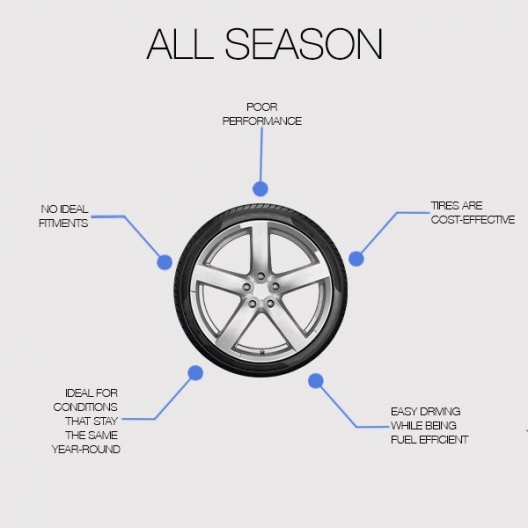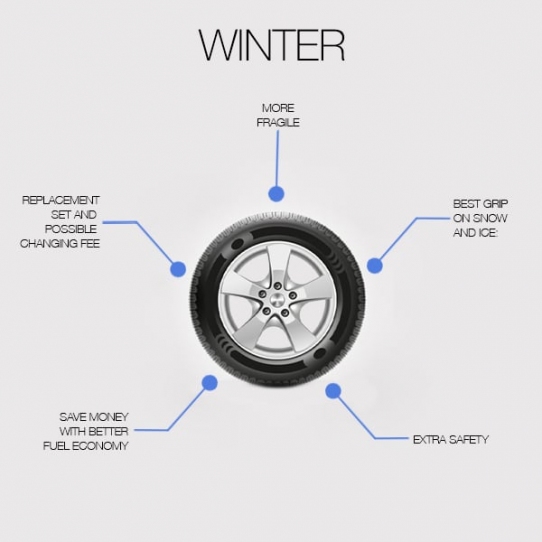What is Better… Winter or All-Season?
Walking into your local brick and mortar store and not knowing what type of tire to buy for the winter can be frustrating. The end goal, ultimately, is to get tires that can last all season. The questions that probably come to mind are: what is the difference between winter and all seasons, or what tires will be for my car, not just this season but the next one? We have broken down for you everything you need to know about each category to help you decide on the tires you need.
Tires such as the Falken Zeix ZE-950 or BF Goodrich All-Terrain T/A K02 are considered to be all-season tires: meaning they are built to last every season of the year, offering a combination of benefits from summer and winter tires. It sounds pretty great knowing that you will only need to buy one set of tires, and it does. However, with these benefits, these tires also have some downfalls. Written below are the advantages and negatives to having all-season tires.

Benefits
- Tires are cost-effective (in the short term): If you are looking for something that can be cost-effective while maintaining your car, then these tires are it. Living in Canada, we all know that having winter tires is a must. Therefore, having all-season means you can use them all year without worrying about having to pay for a new set of tires and installation fees.
- They will give you an easy drive while being fuel-efficient: Because these tires were made to last through multiple conditions, they provide better handling when compared to winter tires during non-extreme weather. Furthermore, they were created to offer drivers a relatively quiet ride, good tread life and excellent year-round performance.
- Ideal for conditions that stay the same year-round: If you live in a city where the weather remains consistent the majority of the year, all-season tires are perfect for you. All season tires are useful in areas where the climate stays even throughout the year such as warm days, rainy days and light winter days.
Negatives
- No ideal fitments: The performance of these tires falls somewhere between good winter and summer tires. Meaning, when buying these tires, you won’t have a perfect fitting either during the winter or the summer. So these tires won’t provide the same amount of extreme grip and sharp handling as a summer tire. Likewise, they are not designed to handle severe winter conditions like trekking through snow or driving on ice.
- Poor performance: Knowing that some regions in Canada have harsh winters, if this is your case, then these tires will cause damage to your car’s performance. When trying to drive on roads that are snowy or icy, or when temperatures are extremely low these tires will stiffen, making it harder for you to drive.
Michelin, Bridgestone, or Goodyear all have tires made specifically for the winter season. This particular variety of tires can only be used when temperatures drop below 7 degrees. Just like the all-season tires, winter tires have multiple benefits and limitations.

Benefits
- Best grip on snow and ice: One of the advantages of having winter tires is that they are designed especially for harsh weather conditions such as some regions in Canada face. When driving through snowstorms, these tires offer great traction due to their increased number of biting edges and high sipe densities. Furthermore, made with a larger percentage of natural rubber in the compound to stop it from hardening.
- Extra safety: They provide increased security, which minimizes the risk of getting involved in at-fault accidents. Due to their enhanced grip, they are designed to brake effectively and react better than all-seasons tires in emergencies.
- Save money with better fuel economy: Money is saved due to the better fuel economy due to the tire’s gripping ability reducing the amount of wear and prolonging life. Using the right tires in their associated conditions will result in less tire wear, and thus saving money.
Negatives
- Replacement set and possible changing fee: On the other hand, winter tires need replacement when the roads clear up, plus adding money twice a year for the actual changing of tires. This can be expensive when fine-tuning your vehicle every season.
- More fragile: The rubber used to create the winter tires is softer, but it also wears out faster than the one used for all-season tires if used in unsuitable weather conditions.
So What Tires are Better?
The answer is it all depends on your needs such as where you live and weather conditions throughout the year. Though weather conditions through the majority of Canada hit the extreme ends, which is why we recommend winter tires, there are other regions where the weather stays consistent. If this is your case, get the all-season tires, and take advantage of what these tires have to offer.
LEAVE COMMENT
You must be logged in with  to post a comment
to post a comment




Not logged in?New Customer?
Lost your password?
Back to login